- Home
- Amy Harmon
The Queen and the Cure Page 4
The Queen and the Cure Read online
Page 4
“And he did not try to stop the villagers last night?”
“No. Maybe he didn’t know. But he was with the elders here, though he didn’t speak.” Her throat worked against the emotion lodged there, her betrayal evident, and Kjell guessed the “well-respected” Byron was the elder with the trembling hands and drooping skin.
“I don’t see everything. I don’t see most things. And I rarely see good things. I see pain. Fear. Death. Anger. Maybe because love isn’t as . . . dark, it’s harder to see. The terrible things put off a scent. A signal. Or maybe they send ripples through time.”
“Ripples?”
“Like ripples in a pond. You throw a stone into the water, and the impact sends waves outward in every direction. It is like I am on the shore, yet the ripples still find me, far as I might be from where—or when—it all occurs. I cannot control it. Most of the time, I can’t change it. I can only see it and do my best to warn of its arrival. Some ripples are just that . . . ripples, but some are huge waves. Sometimes we can catch the wave and ride the current. Sometimes we can dive beneath the churning, but we cannot keep the wave from coming. Sometimes it only brushes my feet, and sometimes I only observe, but the wave still comes.”
“And you saw me?”
“Yes. Many times. More times than I can count. I saw you, and I saw death.”
“Your own?” he asked. She saw him, and she saw death, yet she wasn’t afraid of him.
“Yes. And no. I saw the moments that came before. I felt the anger of the villagers. I saw my fear . . . and falling. I knew I would fall.”
“And you want me to help these people?”
“Some of them,” she whispered, and she tried to smile. “Maybe not all.”
“They will still hate you,” he replied grimly.
“Some of them. Maybe not all,” she repeated, nodding. “But not asking you to help them . . . when I know you can, would be like knowing the water is bad and not telling anyone. It isn’t about me. It’s about responsibility. The Gifts we are given are not given for our benefit but for the benefit of mankind.”
Kjell groaned inwardly, his dread growing by the second. This slave woman, this red-haired paragon of virtue and long-suffering, would be his undoing, and it would not be a sweet unraveling.
***
She followed him, her gait brisk, keeping pace with the guard as they entered Solemn on horseback. The village was an assortment of clay and stone structures, one blending into the next, rising out of the dust and butting against the cliff walls. Quondoon was a desert bedecked with the occasional rich oasis, and Solemn, sitting at an elevation that grew rocks and little else, was not one of them.
Kjell slowed and demanded that his men circle their horses around Sasha, shielding her from the eyes of those who might wish her harm. She was the reason he was here. He didn’t want her dragged off.
As they made their way along the main thoroughfare—the only street bigger than a mountain path—the villagers watched from their doorways and the sides of the street, their animus obvious, their eyes watchful and wary. Some of them even fell in behind the soldiers, their fear not as great as their curiosity, and by the time they reached their destination, a small parade had assembled behind them.
Jerick and the first group of soldiers, as well as the elders of Solemn, were gathered in front of an establishment hung with a sign that declared it an inn. Kjell didn’t suppose there were many travelers on the road to Solemn, but apparently there were a few. The building boasted three stories, forming a rectangular edifice complete with rows of perfectly square windows and topped with a flat roof. Some sort of garden was built on the roof, the trees and plants giving the establishment the appearance of hair. On both sides of the street, similarly styled clay structures stood in solidarity—a forge, a church, a stable, a tavern, and an apothecary. The apothecary was the largest building, and Kjell wondered if the owner had grown rich selling herbs and tonics to the sick people of Solemn.
“We have begun preparing a feast,” Syed said, raising his voice to be heard. The people grew quiet, their resentment palpable. “You can take your horses to the stable.” He indicated the structure and the enclosure across the way. “You are our guests. We will have our women prepare baths for your men, though it will take us some time to arrange quarters for so many.”
“I’ve decided we will not need baths or food. We are told the water is unclean,” Kjell said, projecting so his words reached the edges of the crowd. A murmur rose through the assembly.
“It’s making your people sick,” Kjell insisted.
“You may be the King’s Guard, but you know nothing of Solemn,” Syed protested.
Kjell shrugged. “It matters not to me whether you believe me. We will not be staying in Solemn. And we will not be drinking the water.” They would not even be dismounting from their horses if he had his way.
“The woman lies,” an elder hissed, pointing toward Sasha, laying the blame, and Kjell shrugged once more, though his ambivalence was feigned.
“Why would she do that?” Kjell demanded.
“To frighten the people,” Syed warned.
“To frighten them so much they would kill her?” Kjell scoffed. A guilty muttering rose again.
“She is clearly unharmed,” another elder said. “She lies to you too. It is she who makes the people sick.”
The villagers pressed and surged, closing around Kjell’s men, emboldened or simply curious, he couldn’t tell, and the horses shimmied and stomped, feeling the energy and the emotion gathering. They were armed soldiers on horseback, protected by their prowess and recognized as emissaries of the king. He was the king’s own brother, yet he knew that if the elders of Solemn could incite the crowd, the sheer numbers would overwhelm them.
Someone threw a stone, and then another. Rocks began to rain, striking the horses and the occasional guard, but they were aimed at the woman who had been accused of causing all the suffering. Sasha cried out in pain, and Kjell drew his sword. His men, following his lead, immediately unsheathed their own.
“By order of the crown, there will be no harming or casting out of the Gifted. They are bound by the same protections and laws every citizen of Jeru enjoys. If you stone, you will be stoned. If you harm, you will be harmed. If you cast someone out without cause, you will share the same fate.”
The people began to step back, and his men moved their horses forward, their swords extended, their intentions clear. Some of the villagers began to run, some covered their heads, and the elders threatened wildly, demanding the soldiers leave the village at once.
He felt a hand on his leg, tugging at him, demanding his attention, and he looked down into Sasha’s frightened face. Her veil had fallen and her hair was in tumbled disarray.
“They are suffering. Will you help them?”
“There has to be some justice,” he argued incredulously, staring down into her bottomless eyes.
“There was justice. You are my justice. You saved me. Now you will redeem them,” she implored.
“I will not!”
“You are a Healer, not an executioner.”
“I am both!” he roared, his indignation toward her almost as great as his outrage over what had been done to her.
“You can’t be both,” she rebuked gently. A knot was already forming on her cheek, and a thin line of blood welled up in the abrasion. His anger swelled again, so great it enlarged his chest and pounded in his temples. He pressed his fingertips to the wound and wiped the blood away, leaving flat, unbroken skin in its wake.
“Kjell of Jeru is a Healer,” Sasha shouted, her eyes locked on his, pleading. The murmur became a new kind of rumbling. “He healed me, and he can heal your sick,” she cried, lifting her voice to the crowd. “Bring your sick to him, and you will see.”
A hush grew over the riotous crowd, and for a moment every breath was drawn in wonder. It rippled through the gathering, the possibility of her assertion, the prospect of hope. His men were motionless, their blades level, listening for his command. The people were frozen in anticipation, silenced by the seduction of a chance. And Sasha clung to his leg, beseeching, waiting for him to bend to her will. He eyed the villagers, their cautious faces, their veiled optimism, the scorn of their leaders. And bend he did.
“If they want to be healed, let them come,” he acquiesced. “Let the innocent come. But I will not heal them.” He tipped his blade toward the elders, condemning them. “I can’t heal men’s hearts,” he added, and immediately felt the weight of his own guilt.
Sasha nodded, withdrawing her hand from his leg. She turned without another word and began to push through the crowd that only minutes before had been trying to stone her.
They parted for her immediately.
Kjell didn’t know where she was going or what she intended, but he drew in behind her and his men followed, a procession of soldiers being led by a servant girl. The wake became wider, the stones forgotten, and the people watched them go.
Kjell wondered if anyone would follow, if anyone would have the faith to bring their dying to him. There was a time when he wouldn’t have followed a Healer. Not for himself. But maybe for Tiras. For Tiras he would have done anything. He would have risked the derision and ostracization of the non-believers. He would have taken a chance and faced the disappointment of false hope. He’d done it over and over again. But their faith was not Kjell’s problem. If they wanted to be healed, let them follow. He would not make it easy for them.
Sasha led Kjell and his men to the empty house of her deceased master, a small home of rock and clay with heavy rugs over the doors and windows. She seemed convinced the people would come and pushed the rug over the door wide to welcome them when they did. Kjell climbed down from his horse, handed his reins to Jerick, and commanded him to post half the guard around the house and the other half back at the clearing where they’d camped the night before.
“I can’t stop you or your horses from getting sick if you drink the water. I may be able to heal you once you are, but I can’t be easing your bowels every time you take a swallow. We will take shifts. Use your swords to keep order if you have to. We will be vigilant, and we will leave as soon as possible.”
Sasha was right. The people came. The first to arrive was a man who was lame, not ill. He hung back, waiting for someone else to go first. He was soon joined by others, some curious, some cautious, many accompanied by people who were obviously ill. Children were carried, men and women were assisted, and some villagers came alone to see what the Healer could do before raising the hopes of their sick. A large crowd gathered, talking amongst themselves, eyeing the home of Sasha’s master, whispering about the servant who had “risen from the dead.” They all knew Sasha had been chased over the cliff, and Kjell’s fury rose inside him again. Their knowledge made them guilty, yet here they all were, in search of a blessing.
He watched them from a window, the covering pushed aside just enough for him to see the growing numbers. Sasha had straightened the small home and changed her gown into something equally plain but not nearly as stained. She tidied her hair and washed herself in water he could only guess she’d fetched from the pool between the cliffs. She poured him a glass of tepid wine and drew some dried meat and hard bread from a cupboard in the small galley, placing it on the table and bidding him eat.
He did as she asked, demanding that she eat as well, and refused to partake until she obeyed him.
“They are afraid,” she said quietly, eating daintily, her eyes in her lap.
“Courage is a small price. If they want healing they can pay it,” he grumbled, but his stomach twisted as he spoke. He was afraid too. He hoped the people would leave.
“Peace of Jeru,” someone spoke shyly from the door, and Sasha rose so quickly her small stool toppled. She didn’t stop to right it, but walked quickly to the shadowed entry, her hands stretched toward the woman who stood just beyond, her head covered, her posture timorous. Great circles hung below her eyes and her dress could not disguise the frailty of her body.
“Kimala,” Sasha greeted, as if the woman was a welcome friend. “Come.” The woman name Kimala allowed herself to be drawn into the house, and from outside, voices cried out, accusing her of foolishness.
“The captain can help you.” Sasha said with certainty.
Oh, gods. He didn’t think he could. He stood, battling the need to run, knowing he couldn’t, knowing he shouldn’t. He moved away from the table, toward the woman who was clearly as frightened as he was. She couldn’t run. He could see she was barely walking.
“Lie down.” He pointed at the low bed Sasha had covered in fresh linens, and Sasha assisted the woman, helping her recline until she lay looking at Kjell with fear and fascination. He knelt beside her, and placed his soldier’s hands upon her chest. Her heart practically vibrated, her rapid inhalations fluttering over her lips like tiny wings. The hope in the room took on its own heartbeat, pounding in time with her hummingbird heart.
He couldn’t hear a melody. Not a single, solitary note. He couldn’t hear anything but her echoing expectation, and the realization made him desperate. He yanked his hands away. He was not equipped to wield his gift. His heart began to pound, and his anger—at himself, at Sasha, at his father, at the Creator, at the very world he was born into—bubbled inside him. He was a warrior. He was not a man who loved or nurtured. He’d been given a gift that was so at odds with who he was that he wanted to howl in frustration and sink his sword into something lethal.
The walls of the hut seemed to swell and retreat, making him sway dizzily and close his eyes. He realized he hadn’t taken a breath for a very long time. Suddenly he felt a palm, calloused and slight, pressing into his.
“Kimala is a mother,” Sasha said softly. “She lost her first child, and her second. But last winter she gave birth to a beautiful little boy. He was strong and his cry was so powerful that all of Solemn heard it. Now she is sick, and she worries that she won’t be able to take care of her son.” Sasha’s soft voice brushed against his closed eyes, and her hand stayed pressed against his as she continued talking, telling him about the mother who longed to see her child grow. Kjell’s anger retreated, and something else took its place.
Compassion. He felt compassion.
He opened his eyes and noted the gathering despair in the woman’s gaze. Sasha was holding her hand the way she held his, linking them together. Without letting go of Sasha, he placed his palm on Kimala’s chest once more and listened harder.
The note was so faint he hardly trusted it, a whisper of air that could have been nothing more than an indrawn breath, but he exhaled, matching the sound, so different from the soul-deep, healing melodies he’d felt before. The volume increased, until the breath resembled a sigh and the sigh became a shudder. He made the sound with his teeth and tongue, his hand still in Sasha’s, her hand still clasped around the woman who had begun to stare at him in wonder. Her color warmed, the darkness beneath her eyes and the pallor around her lips disappearing as he pulled the disease from her skin and coaxed it from her bones, setting it free with a final gust of air.
“Bring me another,” he demanded, turning to Sasha. She nodded once and released his hand. She drew the woman he’d just healed to her feet. Kimala moved as though she were in a stupor, her lips trembling with what could only be described as joy.
“Thank you,” Kimala cried, reaching her hand toward him, and he rejected her thanks with a swift shake of his head. “Go and do no harm,” he said awkwardly. “Sasha. Quickly,” he urged, afraid of losing the thread of connection he’d established with his finicky gift. Sasha obeyed, running from the house and returning with a child who was so weak she had to be carried, lying limply against Sasha’s chest, her dark eyes huge and pain-filled.
“This is Tora. Tora loves birds. She can mimic all their calls.” The little girl squeaked softly, the cry like no bird Kjell had ever heard, but Sasha smiled. “See? I know that one.” She pursed her lips and whistled gently, copying the sound the child made.
Sasha laid the girl down on the bed in front of Kjell, and the child closed her eyes as if the bird call had been her last. Without waiting to see if he needed her, Sasha slipped her hand in his, then grasped the child’s hand, connecting them. He laid his palm on the little girl’s tiny chest and strained to hear something that would guide him. He thought he heard whistling and opened his eyes to bid Sasha to cease. She was watching him soundlessly, her lips soft and silent.
He realized the whistling wasn’t in his ears but in his chest and in his hands. The child’s song was very like the timid chirping of a small bird. He focused on the sound and struggled to recreate it, his throat constricting, resisting the pitch.
His grip tightened on Sasha’s. “The bird call. Do it again,” he demanded. She obeyed instantly, trilling softly, and he grasped the sound, magnifying it until his head and hands were ringing with the ear-shattering vibrations. Then he focused on the inky illness that coated the child’s every breath and infused it with the piercing shrill. It disintegrated with an audible pop, and the child’s lips parted in a soft snore. He’d put her to sleep. He fell back, releasing the pulse and removing his hands.
“It’s gone. She’s well,” he gasped. “Take her away and bring me someone else.”
Sasha scooped the child up and was out the door before he could ask her twice. With each person she brought before him, she told him something about them, something small but significant, something that allowed him to find the kernel of human connection that made healing possible. And she always took his hand.
He healed one after another, each healing song a different timbre, a different cadence, a different tone. Some songs sounded more like a series of clicks, some were high and shrill, some the sighing shape of the wind, like the mother who’d brought forth a child, only to grow ill shortly after. An old man had a song like a deep bass drum, and Kjell’s spirit thrummed with the strain of matching it. But match it he did, and the old man’s sickness fell away, leaving him free to leave Kjell’s presence by his own strength.

 Prom Night in Purgatory
Prom Night in Purgatory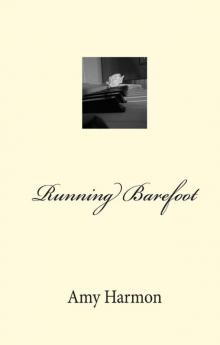 Running Barefoot
Running Barefoot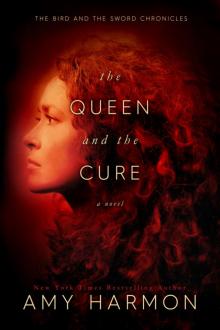 The Queen and the Cure
The Queen and the Cure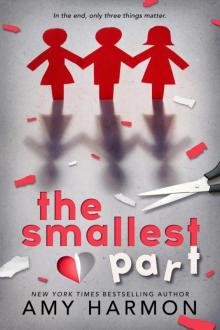 The Smallest Part
The Smallest Part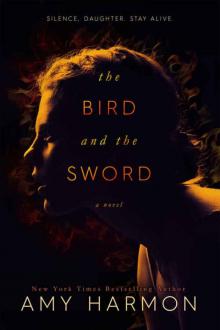 The Bird and the Sword
The Bird and the Sword The Song of David
The Song of David Infinity + One
Infinity + One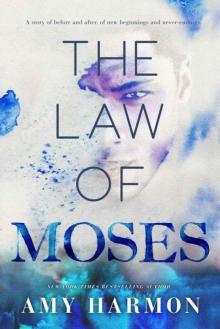 The Law of Moses
The Law of Moses A Different Blue
A Different Blue From Sand and Ash
From Sand and Ash What the Wind Knows
What the Wind Knows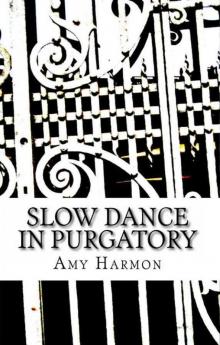 Slow Dance in Purgatory
Slow Dance in Purgatory Romance Through the Ages
Romance Through the Ages